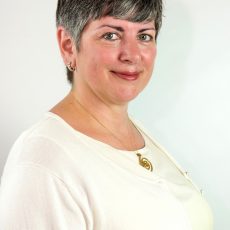
Maria Arpa MBE
Maria has made interpersonal skills a lifetime project. Growing up in London in housing declared unfit for human habitation to immigrant parents, Maria experienced first-hand just how easy it is to become dysfunctional. Her Maltese parents were traumatised by World War Two which added to the stress of growing up in poverty. Through a sheer refusal to accept her lot in life, she removed herself from the slums and began a journey of development.
Alongside a 25-year career in marketing and advertising, she developed her talent for engaging people in healthy conversations through her experiences as a Samaritan Volunteer, a Counsellor, a Reiki Master, a Mediator and Chief Executive of a community mediation service. Maria also spent time at the sharp end running her own business for 15 years and working as a stand-up comic for five years whilst bringing up 2 children.
In 2004, having run a community mediation service for 3 years and developed her own ideas about social change, community engagement and conflict resolution, Maria went solo and began working on her doorstep in the London Borough of Brent engaging statutory agencies and local people in ideas of Nonviolent Communication, Conflict Resolution and Restorative Justice. Others were soon interested in participating- and a team began to form.
At a time when the mediation industry’s general opinion was that mediation was not possible when there has been physical violence, Maria set out to prove that violent people were actually not that difficult to work with. With that in mind, in 2006, and as a direct response to the increase in gun crime and drive-by shootings on her road, where the local community were still mourning the fatal shooting of 7 year old, Toni Ann Byfield, Maria set up The Centre for Peaceful Solutions; a charity dedicated to helping people resolve conflict without the use of violence.
Maria developed the Dialogue Road Map – a communications tool designed to break down barriers and get engagement when the other person is resistant, hostile, angry, violent or resentful. The Dialogue Road Map draws on Needs Based Theory, Person Centred Counselling, Nonviolence Philosophy and Appreciative Enquiry. Maria’s key influencers are Marshall Rosenberg, Carl Rogers, Gene Sharpe and Alfie Kohn.
Maria came to understand how conflict is at the heart of destructive behaviour and that, with a change in attitude towards it, conflict could be the source of positive change. Maria chose to devote her life to sharing this learning with people who have fewer options in life in order to help them realise their own capacity to contribute to their own well-being and to their community. Her own background has been key in her ability to reach ‘hard to reach’ people. Maria’s expertise is in building rapport quickly even when the other person is hostile or resistant and in teaching others how it is done even when they have limited capacity to learn.
As part of her work Maria has trained healthcare professionals and frontline workers including Doctors, Nurses, Social Workers and NHS staff in how to engage patients and clients into co- operative relationships by diffusing conflict and motivating positive change. Maria also works one on one with people who have mental disorders such as Schizophrenia, Bi-polar, OCD, Addictions, Eating Disorders, PTSD, Insomnia, Gender Dysphoria, ADD, and Borderline Personality Disorder. Her skill is in reaching and giving voice to the part of them that wants to make positive change.
In 2007, The Centre for Peaceful Solutions was awarded half a million pounds by Central Government to develop a model of mediation for violent crime and anti-social behaviour. The work took her into some of the most deprived areas of London where she and her team engaged with gang members, violent offenders, local youth, many of whom were labelled as having mental health issues. In 2009 the work was instrumental in preventing a retaliation shooting.
Her work takes her into communities, organisations, schools and prisons where she engages with the most challenging and influential participants. She works in the UK, Europe and New York passing on the skills which empower people to take self-responsibility and to find solutions.
She has been pleasantly surprised by the warm welcome she has received from the beneficiaries and undeterred by the inability of statutory agency workers to challenge their systems in order to find resolution in difficult and recurring situations.
Maria believes that when people believe they have no ‘voice’, they resort to violence, manipulation, self-harm and other destructive behaviours as tragic attempts to be heard. The driving force behind Maria’s work is showing people who feel excluded, marginalised, disadvantaged or powerless how to articulate their needs in ways which are more likely to be heard and how to challenge ‘authority’ in ways which are more likely to get their needs met.
Maria is a former Chair of Mediation UK, has a Master’s degree in mediation and conflict resolution and is a sought after speaker and trainer. She regards being a mother to two young adults as her most rewarding communications challenge and along with her partner David, who now co-runs the charity with her, she strives to model the communication they seek to share in their work.
Described, in 2012, by the Civil Mediation Council as one of the UK’s ‘top’ mediators, the Dialogue Road Map has gained recognition amongst senior mediation professionals.
Maria’s ‘hands-on’ experience ranges from Multi-National Corporate conflict to Street Gang threats to life and everything in between. Typically, neighbours at war, youth conflicts, family break up, family reconciliation, business deals gone wrong, interpersonal conflicts at work and group communication break-down.
Clients include Police, Social Services, Local Authorities, Schools, Prisons, Care providers, Housing Associations, Law Firms, District Attorney’s Office, Charities, Multi-National Corporate as well as individuals, couples, families, neighbourhoods and communities.
Maria’s book, The Heart of Mindful Relationships was published in June 2012 and her second book Mindfulness at Work was released in March 2013. Both books have gone into reprint.